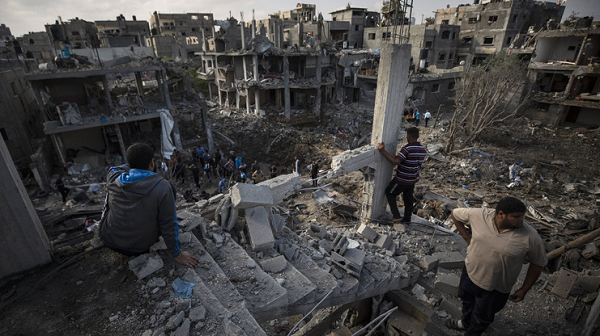Canadians in Gaza unable to connect with evacuation flights, implore the government to step up
The Canadian government has answered calls to evacuate its civilians trapped in the Israel-Hamas war, sending planes to transport citizens out of Tel Aviv — but the lack of evacuation plans for those in the blockaded Gaza Strip has left trapped Canadians feeling desperate.
On Wednesday, Foreign Affairs Minister Melanie Joly outlined the evacuation plan, stating that Canadian Armed Forces aircraft will begin shuttling Canadians from Tel Aviv to Athens, Greece where they will be connected with flights home. The first two evacuation flights left on Thursday, carrying 128 and 153 passengers respectively, officials say, and the first has already landed safely in Athens.
But there’s currently no way for Canadians in the blockaded Gaza Strip to reach these evacuation flights, sparking calls for the government to do more.
On Thursday, a 10-year-old girl sent out a plea to home.
“I’m a Palestinian and a Canadian,” she said in a video sent to CTV National News.
“Everything has just been so scary, so I’m telling the government to help me and my parents and my family, me and my brother and my sister and my mom.”
She explained that she and her family — three children and their mother — arrived in Gaza through Egypt before the conflict broke out. The Abuwarda family was there to visit their sick grandfather.
With them, their 15 and 11-year-old cousins and their aunt. Seven Canadians trapped in Gaza, and two worried fathers in Ontario, desperate to get them out.
In the video, the room is dark around her — electricity has been cut off in the Gaza Strip.
“No water, no internet, nothing since yesterday,” she said in the video. “Please, please help us, I really want to go back to my country.”
The Gaza Strip has been under a blockade that restricts the movement of people and goods in and out of the region since 2007, when Hamas took control. Hamas has been declared a terrorist organization by Canada and many other Western nations.
On Saturday, Hamas militants launched a surprise attack on Israel, firing rockets indiscriminately into Israel and sending gunmen to attack towns and a music festival, killing hundreds of civilians and taking hostages. Israel launched airstrikes in response and declared a “complete siege” on Gaza, cutting off access to food, water, fuel and electricity. Authorities in Israel say that the conflict has killed 1,200 in Israel and around 1,300 in Gaza as of Thursday.
CTV News has confirmed the killing of three Canadians. The government is following reports on another four Canadians who remain missing, but hasn’t confirmed if they are among the hostages or not.
Since the conflict broke out, Canadians trapped in the region have been scrambling to find flights out and calling for government aid amid a wave of commercial flight cancellations.
That aid is now on the way for Canadians in Israel, but although Global Affairs says it is “working on additional options for those who cannot reach the airport in Tel Aviv,” it’s unclear how Canadians would be able to escape Gaza with no humanitarian corridors set up.
“We are also exploring other assisted departure options for those in the West Bank and Gaza, including ground travel across the border to Jordan,” the agency said. “We continue to monitor the situation closely and we are communicating directly with Canadians in Gaza who have contacted us. We also continue to liaise with the UN and other partners and likemindeds to explore all options to provide support to Canadians there, including any possible evacuation opportunities.”
Michael Bueckert, vice-president of Canadians for Justice and Peace in the Middle East (CJPME), said that it’s “unacceptable” that Canada isn’t trying harder to find a solution for Palestinian-Canadians stuck in Gaza or in the West Bank.
“Canada is dealing with this reality where it’s trying to organize an evacuation for its citizens, but for those of its citizens in areas of occupied territory that Israel controls … the reality is that because of Israeli policies, they are not allowed to go to Tel Aviv,” Bueckert said.
“Canada is effectively having to treat its own citizens as second-class citizens.”
According to Global Affairs Canada, 5,685 Canadians are registered in Israel and an additional 465 Canadians are registered in Gaza and the West Bank. The agency has responded to 2,793 enquiries since the beginning of the conflict.
Officials don’t have an exact tally of how many Canadians might be stranded in Gaza currently, but they stated Wednesday that they have received 250 requests for federal help from Canadians registered in Gaza and the West Bank, and that 70 of these came from Gaza specifically.
Mohanad Kullab is one Canadian trapped in Gaza right now.
“The situation for the last five days is very bad,” he told CTV National News. “Civilian houses being bombed. They have nothing to do with any politicians, we don’t belong to Hamas.”
Kullab is a university professor. His wife, now eight months pregnant, is a dentist.
“It’s very stressful for me,” he said. They have a battery they are using to power a single light, and have to buy water to drink because the facilities have been cut off.
CALLS FOR CANADA TO PUT PRESSURE ON ISRAEL
“The challenges are basically related to the restrictions on movement that Israel has inflicted on Palestinians for decades,” Bueckert told CTV National News on Wednesday. “So when Melanie Joly talks about the fact that maybe not everyone will be able to access the evacuation transport in Tel Aviv, the reason for that is Palestinians have been denied the right to leave Gaza, the West Bank, through Tel Aviv, through the Ben Gurion Airport, for years.”
Although the West Bank isn’t under a total blockade like the Gaza Strip, Palestinians living there have long been unable to access international air travel in Israel. There are no airports in the West Bank, and like in Gaza, Palestinians in the West Bank also have to apply for a difficult-to-obtain permit to use at Ben Gurion International Airport. Palestinians living in the West Bank generally travel abroad by crossing the crowded Allenby Bridge into Jordan first, but this land border crossing was closed on Saturday in the wake of the Hamas attack.
Those in Gaza are unable to leave the region at all due to the blockade. The only other land border with Egypt has been closed since Tuesday, hit by Israeli forces, said to be targeting underground smuggling tunnels.
The Abuwardas have airline tickets to leave through Egypt, but they can’t get there.
These aren’t problems that Canada has created, Bueckert said, but he believes we could be pushing back more and “trying to negotiate (an) evacuation plan that is not privileging one group over another.
“Why is Canada throwing its hands in the air on the lives of its own citizens?”
He said that Canada could be putting pressure on Israel to allow Palestinian-Canadians to travel more freely in order to get to an evacuation flight in Tel Aviv.
“(Canada) could ask Israel to waive those policies, to ask Israel the ability to allow its own Canadian citizens to leave Gaza, leave the West Bank through the normal routes, go to Tel Aviv to meet up with the evacuation airport,” Bueckert said. “There’s no reason Canada couldn’t make that request of Israel. There’s no reason for Canada to play into that discriminatory system. That would be a moral route, but whether Israel would agree to that, I have no idea.”
Joly stated Wednesday that if a humanitarian corridor is established by the UN for Gaza, they would look at potentially moving Canadians through Jordan to access commercial flights out — not the CAF evacuation flights.
“At this point, there has been no information coming from the UN regarding evacuation as we speak, but we keep our options open,” she said.
Reuters reported Wednesday that while Egypt has discussed plans with the U.S. and others to provide humanitarian aid to the Gaza Strip, the country has rejected moves to set up safe corridors(opens in a new tab) for those trying to flee the enclave, citing Egyptian security sources.
FEAR ON THE GROUND IN GAZA
As airstrikes continue to rain down on the sealed-off Gaza, trapped Canadians say they are fearful for their lives.
“I’m very scared. I really need help. Everything is destroyed around us. Everything,” Khloud Fayyad, a Mississauga, Ont. resident, told the Canadian Press on Thursday.
Fayyad left her three sons at home in Canada to come visit her 85-year-old father in Gaza a week before the conflict broke out.
“Please, please, please, please help us,” she begged.(opens in a new tab)
According to the latest report(opens in a new tab) from workers from United Nations Relief and Works Agency — the UN agency responsible for Palestinian refugees — on the ground in Gaza, nearly 218,600 internally displaced people are sheltering in 92 schools in an attempt to avoid airstrikes. Potable water and food are limited, and a “water crisis is looming in UNRWA emergency shelters and across the Gaza Strip due to damaged infrastructure” as well as a lack of electricity to pump and purify water.
Around 21 UNRWA health centres have been affected by airstrikes thus far, and only eight were able to provide primary health-care services on Wednesday. Two health centres are on the brink of closure due to fuel running out.
UNICEF has estimated that 47 per cent of Gaza’s population is made up of children. As of Wednesday, at least 326 children had been had been killed in Gaza, the Gaza Health Ministery said.
On Wednesday, the International Federation of Red Cross and Red Crescent Societies stated that four Palestine Red Crescent paramedics were killed when ambulances were struck in two different incidents. This comes after an ambulance driver in Israel was killed on Saturday, the organization said.
“Canada provides support to the Red Crescent. Why isn’t Canada speaking out about these atrocities?” Bueckert said.
“Canada should not accept that its citizens are living in a state of siege, in an open-air prison, barred the ability to leave, cut off from access to electricity, to food to water, being indiscriminately bombed — there is absolutely no safe place to be in the Gaza Strip. You have apartment buildings being bombed, you have hospitals being bombed, ambulances, people are told to seek shelter and the places they find shelter are being bombed. This is a horrible situation.”
Global Affairs stated Thursday that they are “deeply concerned about the rapidly deteriorating humanitarian situation in the Gaza Strip.
“Canada calls on all parties to facilitate access for humanitarian assistance to reach those in need, in accordance with international humanitarian law,” the agency said. “Civilians and healthcare workers must be protected at all times.”
Fayyad’s 30-year-old son, speaking from Mississauga, told the Canadian Press that he was frustrated that Canada had moved quickly to aid citizens trapped in Israel, while those in Gaza have no clear way out.
“I like how they’re acting fast but it doesn’t seem like they have a plan for the people of Gaza,” he said.
Bueckert said he’s heard from Palestinian-Canadians who have family in Gaza and the West Bank and are growing increasingly scared for their loved ones—a fear he says is made worse by Canada’s lack of a plan to help Canadians trapped in the region.
“It’s absolutely an intolerable situation for them and their families, and there’s the sense that absolutely no one in the Canadian government is looking out for them,” he said.
–
With files from Reuters, the Associated Press, The Canadian Press and CTV National News Manitoba Bureau Chief Jill Macyshon
This article was reported by CTV News
















